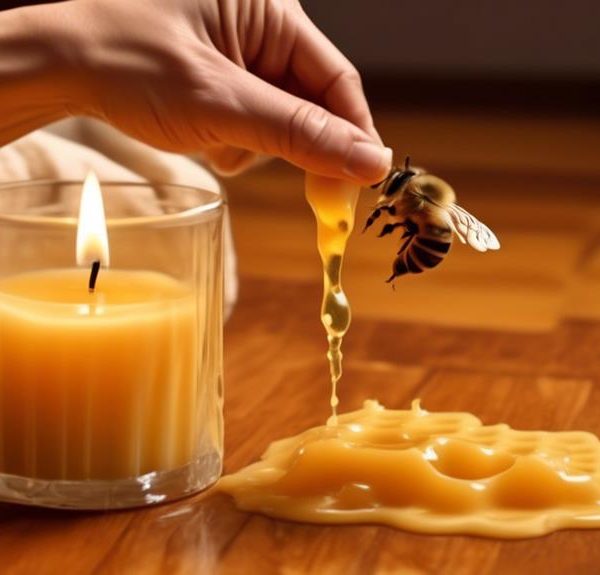Grasp the buzz about urban beekeeping and discover the possibilities and regulations of keeping bees in residential areas.
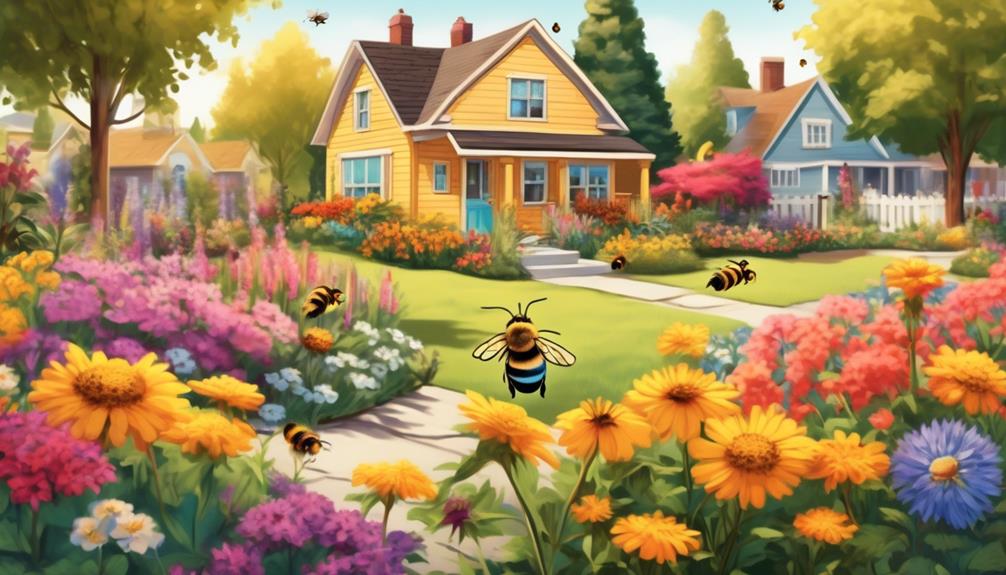
Can You Keep Bees in a Residential Area?
Like a bee to a flower, you're drawn to the idea of keeping bees in your backyard. You're curious, aren't you? Wondering if it's possible and, more importantly, if it's legal.
As an urban dweller, you might think that beekeeping is solely for those living in the countryside, with acres of land and a world away from the hustle and bustle of city life. But what if I told you that urban beekeeping is not only possible but increasingly popular?
However, before you invest in a hive and a swarm of bees, there are some crucial factors you'll want to consider. Are you prepared to find out what they are?
Key Takeaways
- Urban beekeeping is a rewarding and possible activity that can be done in residential areas.
- Bees are essential for pollination and play a crucial role in our food supply.
- Local honey from urban beekeeping can support local biodiversity and help with seasonal allergies.
- Understanding and abiding by local laws and regulations, as well as implementing safety measures, are important aspects of residential beekeeping.
Understanding Urban Beekeeping
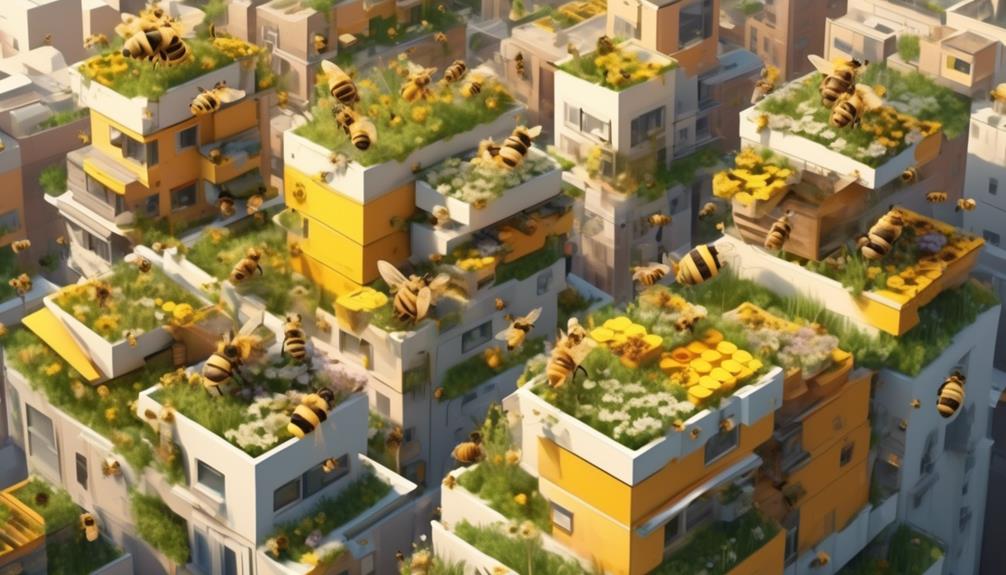
You might be surprised to learn that urban beekeeping, despite its challenges, isn't only possible but also an incredibly rewarding endeavor that can contribute significantly to the health of your local ecosystem. With careful planning, you can create a buzzing oasis even in the most concretized areas. The key is to understand that bees aren't as disruptive as you might think. They're docile, focused on their work, and only sting when threatened.
Urban beekeeping isn't just about producing honey. It's about sustaining the bee population, which is integral to pollination and, ultimately, our food supply. You're contributing to a cause much larger than yourself.
You'll need to research local regulations, as some areas require permits or have restrictions on hive placements. Your bees will need a source of water and a variety of flowering plants for a balanced diet.
It's a commitment, but the rewards are worth it. The hum of a thriving hive, the taste of fresh honey, the knowledge that you're bolstering the environment – it's a sweet deal. So, don't let the city setting deter you. With the right knowledge, you're more than capable of becoming a successful urban beekeeper.
Legal Aspects of Residential Beekeeping
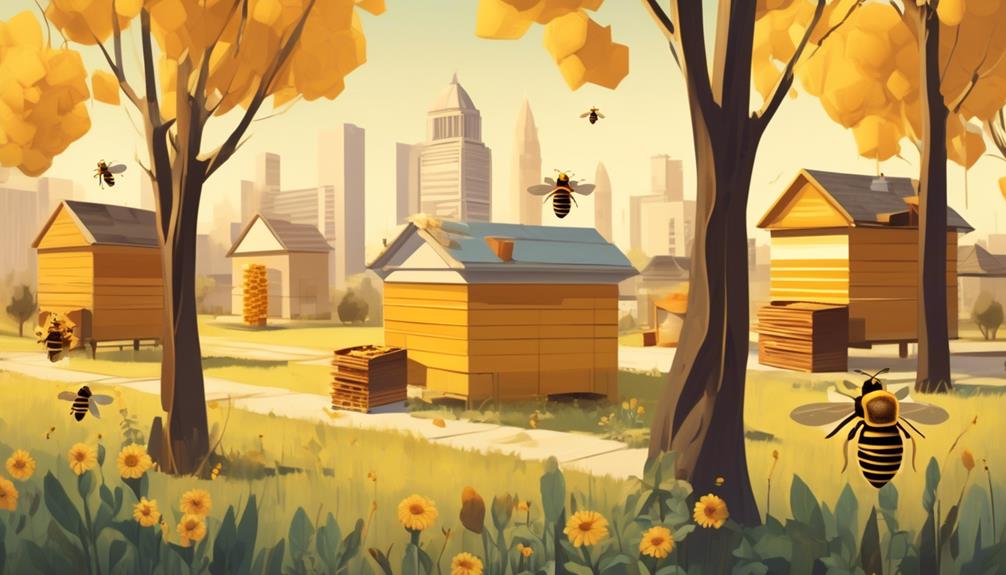
Before embarking on your urban beekeeping journey, it's crucial to acquaint yourself with the legalities involved in residential beekeeping. Laws vary widely from area to area, so you'll need to conduct some thorough research on your local regulations.
Some municipalities require beekeepers to register their hives and may limit the number of hives you can maintain. Other areas may have zoning laws that prohibit beekeeping altogether. Don't let this deter you, however. If your local laws are restrictive, consider lobbying for change. You'd be surprised at how your passion and knowledge about the importance of bees can sway public opinion.
Safety Measures for Backyard Beehives

How can we ensure the safety and success of backyard beehives in a residential setting? It's simple, with a little knowledge and the right precautions, you can safely keep bees even in the heart of the city.
Firstly, consider the hive's location. Place it in a secluded part of your yard, away from heavy foot traffic. Position the hive's entrance facing away from your home and neighbor's yard to direct bees flight path. Strategically placing a barrier, like a fence or shrub, near the hive can help encourage the bees to fly upwards, reducing human-bee encounters.
Regular hive maintenance is crucial. Inspect your hives regularly, but avoid doing it on cold, rainy, or windy days as it disrupts the bees and makes them more aggressive. Always wear protective gear when handling the hive.
Educate your neighbors about your beekeeping activities. Let them know that bees aren't naturally aggressive unless provoked. Offer them honey from your hive, it's a sweet way to maintain good relations.
Benefits of Keeping Bees at Home
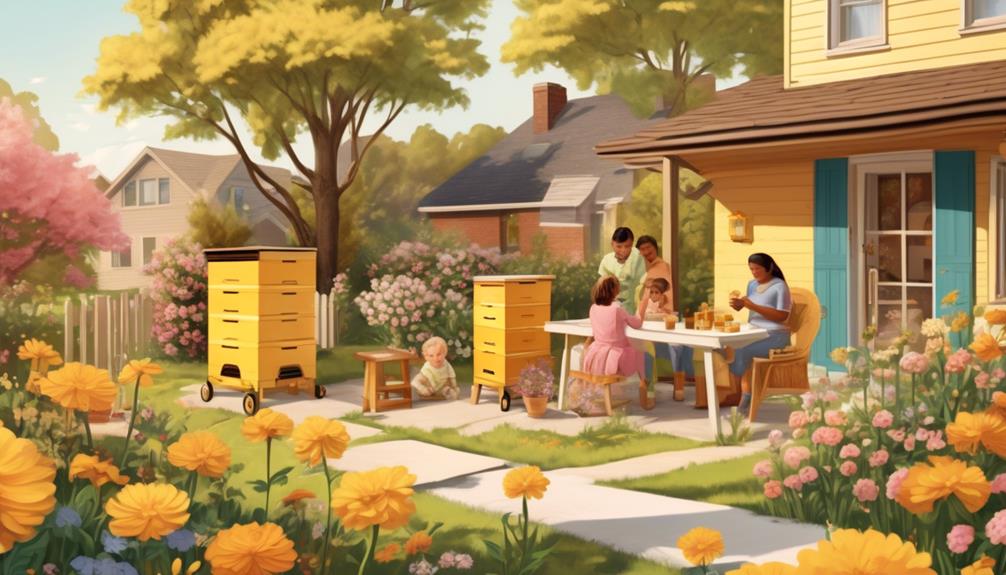
While ensuring safety and peace with neighbors is essential, it's also worth noting the several benefits that come along with keeping bees at home.
Not only do you get to enjoy your own fresh, local honey, but you're also playing a vital role in pollination, and thus, supporting local biodiversity.
Your garden will thrive like never before because bees are nature's most efficient pollinators. They'll ensure your flowers, fruit trees, and vegetable plants are well pollinated, resulting in a beautiful, bountiful garden. You'll be amazed at the difference these tiny workers make.
Having your own honey is a sweet perk. It's pure, unprocessed, and you know exactly where it's come from. Plus, local honey can help with seasonal allergies, as it contains small amounts of local pollen.
Beyond the direct benefits, beekeeping can be a deeply rewarding hobby. You become a custodian of these remarkable creatures, learning about their complex societies and fascinating behaviors. It's a hands-on way to contribute to the environment, becoming part of the solution to the worldwide bee decline.
Overcoming Challenges in Urban Beekeeping
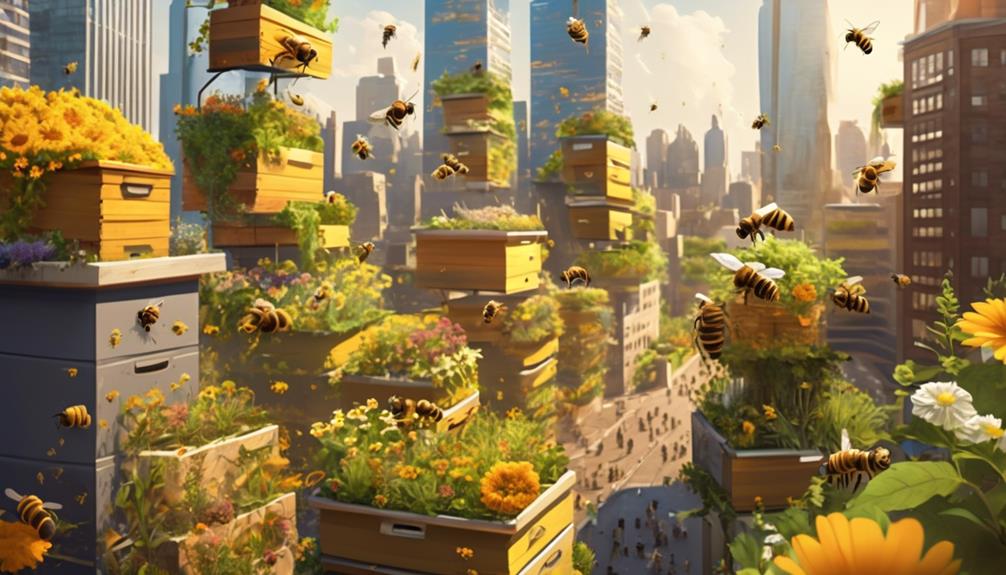
Despite the clear benefits, you'll likely face a few hurdles in your urban beekeeping journey, but don't worry, they're not insurmountable.
Firstly, it's essential to understand local laws and regulations about beekeeping. Certain areas may have restrictions on the number or type of hives you can keep. If you're unsure, check with your local council. They'll provide the necessary information and may even offer advice or resources to help you get started.
Next, you might grapple with finding the right location for your hive. Look for a sunny spot with morning light, ideally away from high traffic areas. A rooftop, terrace, or even a balcony can make an excellent location.
Another challenge is managing bees and their behavior. Bees can become aggressive if they feel threatened. To mitigate this risk, ensure your bees have enough food and water and that their hive isn't overcrowded.
Lastly, remember that beekeeping requires a considerable time commitment. Regular inspections, hive maintenance, and honey extraction all take time. But with passion and dedication, you'll find that these efforts are more than worthwhile. After all, the sweet reward of your own honey, coupled with the environmental benefits, make urban beekeeping a fulfilling endeavor.
Frequently Asked Questions
What Is the Typical Cost of Starting a Beekeeping Hobby in a Residential Area?
You're curious about the initial cost of beekeeping in a residential setting, aren't you? Well, it can vary.
For a basic setup, you're looking at around $300 to $500. This includes the cost of the hive, bees, and essential tools. However, if you want to invest in more advanced equipment or multiple hives, your costs will rise.
How Much Time Does It Take on Average to Maintain a Backyard Beehive?
Maintaining a backyard beehive isn't as time-consuming as you might think. On average, you'll spend about 30 minutes per hive, per week. That's just a few hours a month!
This includes inspecting the hive, checking for disease, ensuring the queen is laying eggs, and harvesting honey.
It's a small commitment for the joy of beekeeping. But remember, it's not just about the time; it's a labor of love that demands passion and dedication.
Can Bees in Residential Areas Have Any Impact on Local Biodiversity?
Absolutely, bees in residential areas can significantly impact local biodiversity. They're key pollinators, and by transferring pollen from one plant to another, they boost plant reproduction. This creates more flowers, fruits, and seeds, which benefits other wildlife.
Plus, a healthy bee population indicates a healthy environment. So, by keeping bees, you're not just contributing to your local ecosystem, you're taking an active role in its preservation.
What Are Some Common Health Risks for Bees in Urban Environments?
In urban environments, bees face numerous health risks. Pesticide exposure is a biggie; it can weaken their immune system and even cause death. Limited food sources, due to less plant diversity, can lead to poor nutrition. Also, they are more exposed to diseases as they often share close quarters with other bee colonies.
So, if you are keeping bees in the city, you have to be extra cautious. Ensure they have a clean, diverse food supply and avoid pesticide use.
Can Residential Beekeeping Be Profitable?
Absolutely, you can turn residential beekeeping into a profitable venture. You'll need to invest in hives, bees, and protective gear initially. However, you can sell the honey, beeswax, and even the bees themselves for a nice profit.
It's not only about money though, there's also the satisfaction of contributing to your local ecosystem. Do your research, follow local regulations and you're on your way to a buzzing business.
Conclusion
Absolutely, you can keep bees in a residential area! Urban beekeeping isn't only legal but also beneficial for the environment. With proper safety measures, your backyard hive will pose no threat to your neighbors.
You'll face challenges, but the rewards of home-harvested honey and a healthier ecosystem will make it all worthwhile. So, why not give residential beekeeping a try?
You'll be joining a community of passionate, planet-loving urban beekeepers.


